TODAY’S READING FROM THE OLD TESTAMENT- 2 SAMUEL 20:14-22:20
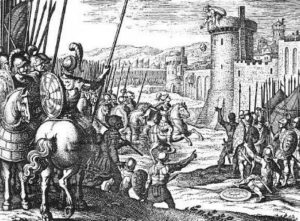 Civil unrest continues as Sheba and those who have joined him in his rebellion against David travel to the city of Abel. Sheba is hoping to gain the support of his clansmen in that city to join his rebellion. David’s army, again under the leadership of Joab, catch up with Sheba at the city of Abel and lay siege against it. Those who are within the city are in a lockdown, surrounded by David’s troops. They cannot go outside the city, or they will be killed.
Civil unrest continues as Sheba and those who have joined him in his rebellion against David travel to the city of Abel. Sheba is hoping to gain the support of his clansmen in that city to join his rebellion. David’s army, again under the leadership of Joab, catch up with Sheba at the city of Abel and lay siege against it. Those who are within the city are in a lockdown, surrounded by David’s troops. They cannot go outside the city, or they will be killed.
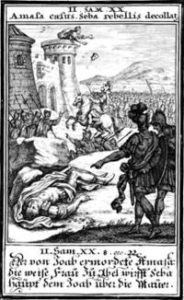 A wise woman from the city of Abel makes a plea to Joab. Rather than needlessly destroying the Lord’s city and its inhabitants, she proposes a bargain. Deal with the root of the rebellion. If Joab and his army will leave the city of Abel in peace, she will ask the people to decapitate Sheba and throw his head over the wall. After all, Sheba is the one behind the revolt.
A wise woman from the city of Abel makes a plea to Joab. Rather than needlessly destroying the Lord’s city and its inhabitants, she proposes a bargain. Deal with the root of the rebellion. If Joab and his army will leave the city of Abel in peace, she will ask the people to decapitate Sheba and throw his head over the wall. After all, Sheba is the one behind the revolt.
Joab and the people of the city of Abel agree. Sheba is killed, and Joab is satisfied. David’s army retreats to Jerusalem, and the city of Abel is spared.
The Book of 2 Samuel ends with two calamities. As we will learn, each is caused by someone’s sin. As King David prays in Chapter 21, he learns that the three-year drought is due to the sin of Saul and his family for their treatment of the Gibeonites. The plague that comes upon Israel in Chapter 24 is divine chastisement for David’s sin.
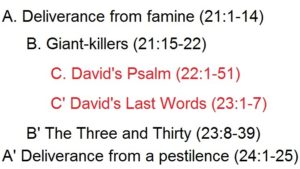 In between these disasters are four victories (21:15-22), two psalms written by David (22:1-23:7), and a list of David’s mighty men (23:8-39).
In between these disasters are four victories (21:15-22), two psalms written by David (22:1-23:7), and a list of David’s mighty men (23:8-39).
When Joshua entered the Promised land under Divine orders to drive out its inhabitants, the Gibeonites pretended to be sojourners from a powerful nation. Deceived by this, Joshua and the Israelites make a covenant not to kill them (Joshua 9) but to allow them to stay, serving them as woodcutters and water carriers.
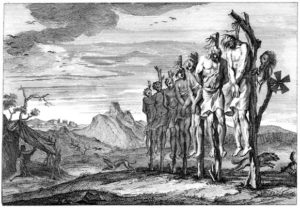 We don’t have the record of the implied incident during which the house of Saul broke the vow and slaughtered the Gibeonites. But here, in Chapter 21, we learn that Saul’s act was the reason that God was bringing this judgment upon the land. Perhaps because the city of Gibeon was in Saul’s tribal land of Benjamin, he wanted them out. Whatever the reason, Saul’s misjudgment brought the present environmental trial of famine upon Israel.
We don’t have the record of the implied incident during which the house of Saul broke the vow and slaughtered the Gibeonites. But here, in Chapter 21, we learn that Saul’s act was the reason that God was bringing this judgment upon the land. Perhaps because the city of Gibeon was in Saul’s tribal land of Benjamin, he wanted them out. Whatever the reason, Saul’s misjudgment brought the present environmental trial of famine upon Israel.
When David receives this word from the Lord, he appeals to the Gibeonites to make reparations. The Gibeonites ask that David give them seven of Saul’s sons to execute by hanging. They will hang before the Lord in the city of Gibeon, the city of King Saul (21:6).
Once again, sparing Saul’s grandson, Mephibosheth, because of the covenant David made with Jonathan, David gave them seven descendants of Saul to be impaled at Gibeon at the beginning of the barley harvest.
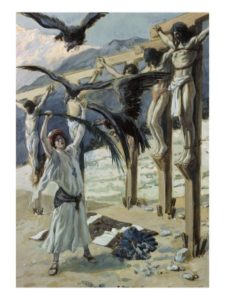 Rizpah, the mother of two of the victims, Saul’s sons Armoni and another Mephibosheth, spread sackcloth upon a rock and stayed there throughout the harvest season, keeping vultures away from tearing the bodies during the day and wild animals from eating them at night. You may remember reading of Rizpah, a concubine of Saul, who was involved with Abner when Abner abandoned the house of Saul and joined David (2 Sam 3:6-12). David, hearing the news of what Rizpah was doing, arranges for the bones of these men to be buried in the tomb of Kish, Saul’s Father. David also asks for the bones of Saul and Jonathan to be buried there.
Rizpah, the mother of two of the victims, Saul’s sons Armoni and another Mephibosheth, spread sackcloth upon a rock and stayed there throughout the harvest season, keeping vultures away from tearing the bodies during the day and wild animals from eating them at night. You may remember reading of Rizpah, a concubine of Saul, who was involved with Abner when Abner abandoned the house of Saul and joined David (2 Sam 3:6-12). David, hearing the news of what Rizpah was doing, arranges for the bones of these men to be buried in the tomb of Kish, Saul’s Father. David also asks for the bones of Saul and Jonathan to be buried there.
2 Samuel 21:14 14 They buried the bones of Saul and Jonathan his son in the country of Benjamin in Zela, in the grave of Kish his Father; thus they did all that the king commanded, and after that God was moved by prayer for the land.
After this incident, we read of four victories over the Philistine giants.
- Abishai, David’s nephew, comes to David’s rescue when David, weak and exhausted, is about to be killed by Ishbenob, a giant in full armor whose spear weighed more than 12 pounds. It was such a close call that David’s men appeal to David not to go out to battle again, lest the light of Israel be snuffed out.
- Sibbecai, the Hushathite, successfully defeats another giant, Saph.
- Elhanan from Bethlehem (2 Sam 23:24) kills the brother of the giant Goliath, the Gittite, whose spear was as large as a weaver’s beam.
- Jonathan, another nephew of David, the son of David’s brother Shemei, kills a giant at Gath with six fingers on each hand and six toes on each foot.
We have a record of David’s song, which he sang to the Lord after being rescued from Saul and all his other enemies. The words will be familiar to you. They are found in Psalm 18.
It is believed that David wrote this song after God had made a covenant with him and before his sin against Bathsheba and Uriah the Hittite. (He couldn’t have written in good conscience the words found in verses 20-27, knowing how his sins had impacted his household and nation).
David rightly praises God as His rock, fortress, Savior, refuge, shield, salvation, high tower, rescuer, and the One who is worthy of all worship and praise.
He writes of God’s awesome power and holiness (22:8-17) and gives Him praise for delivering him from powerful enemies who hated him and were too strong for him.
This is a wonderful picture of the favor we have ‘in Christ’. We can say, He delights in us.
TODAY’S READING FROM THE NEW TESTAMENT – ACTS 1:1-26
Today we start the action-packed book that could be titled “Jesus Continued.” Dr. Luke, the physician who accompanies Paul on his later missionary journeys, clues us in that this is the continuation of his first volume (The Gospel of Luke).
Acts 1:1-2 1 The first account I composed, Theophilus, about all that Jesus began to do and teach, 2 until the day when He was taken up to heaven, after He had by the Holy Spirit given orders to the apostles whom He had chosen.
Luke implies that in his earlier writing, the Gospel of Luke, he was writing of what Jesus began to do and teach in his personal physical body. In this second volume, he will write of what Jesus continues to do and teach, primarily in his Spirit-filled corporate body of redeemed believers, the church.
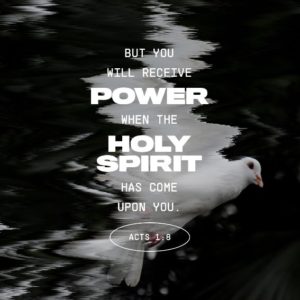 Over a period of 40 days, the risen Lord Jesus appears to His disciples and instructs them pertaining to the kingdom of God.
Over a period of 40 days, the risen Lord Jesus appears to His disciples and instructs them pertaining to the kingdom of God.
He lets them know that there is more to come! God has appointed a time and place for what He has promised. Jesus clarifies that He is not speaking specifically about when the kingdom of God will come to Israel. That is another matter for another time, fixed by the Father’s authority (Acts 1:7).
He is speaking about the Promise of the Spirit. He is speaking about the outpoured blessing promised as part of the New Covenant inaugurated by Jesus’ atoning death on the cross, by which He would put a new spirit in them and write the law of God on their hearts. He is speaking about the Holy Spirit bringing the intuitive knowledge of God, enabling Christ to live in and through them, emboldening them as witnesses to the gospel to all nations.
In Acts Chapter 2, we know that the Promised Holy Spirit is given on the Feast of Pentecost.
Pentecost is 50 days after the Feast of First fruits when Jesus rose from the dead.
In the Book of Leviticus 23, Exodus Chapters 23 and 34, Numbers 28:26, and Deuteronomy 16, we read about the Feast of Pentecost. also known as the Feast of Harvest, Shavuot, Feast of Weeks, Feast of the Ingathering.
The word ‘Pente’ means 50. It’s the fiftieth day.
Leviticus 23:16 16 ~’ You shall count fifty days to the day after the seventh sabbath; then you shall present a new grain offering to the LORD.
So, 50 minus 40 equals a 10 day wait.
Some of us have difficulty waiting 10 seconds, much more 10 days.
Although the 120 gathering in the upper room in Jerusalem did not realize it, the Holy Spirit would be given on a fixed date by the authority of the Father, the Feast of Pentecost.
Jesus could have told them how long they would have to wait because He is God, but instead, He teaches His disciples to wait on the Father’s timetable.
Jesus clarifies what the waiting is all about:
Acts 1:8 8 but you will receive power when the Holy Spirit has come upon you; and you shall be My witnesses both in Jerusalem, and in all Judea and Samaria, and even to the remotest part of the earth.”
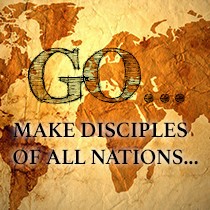 This verse contains an outline of the Book of Acts. The Holy Spirit is given, and the church at Jerusalem is born in Chapter 2. The Holy Spirit empowers them to witness to the Lordship and saving work of Christ in Jerusalem in Chapters 2- 7. The church is scattered, and the witness to the gospel is spread throughout Judea and Samaria (Acts 8-9) and then to the Gentiles and the uttermost parts of the earth (Acts 10-28).
This verse contains an outline of the Book of Acts. The Holy Spirit is given, and the church at Jerusalem is born in Chapter 2. The Holy Spirit empowers them to witness to the Lordship and saving work of Christ in Jerusalem in Chapters 2- 7. The church is scattered, and the witness to the gospel is spread throughout Judea and Samaria (Acts 8-9) and then to the Gentiles and the uttermost parts of the earth (Acts 10-28).
In verse 9, we learn of a very important event- the ascension of Christ. This is the coronation of Christ the King. Jesus ascends to the Father as the God-man representing those who would believe in Him throughout the ages. He is given a name, a credential above every other Name, and functions as our High Priest, Advocate, Exalted and Glorified Head, our Living Word, and will return as our Bridegroom Shepherd-King and Judge.
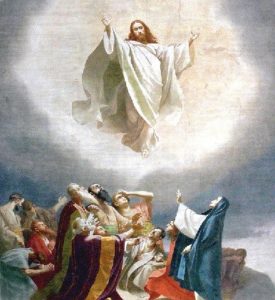 If Jesus had not ascended to the Father to be seated at His right hand as our representative, the Holy Spirit could not be given (John 16:5-15; John 7:37-39).
If Jesus had not ascended to the Father to be seated at His right hand as our representative, the Holy Spirit could not be given (John 16:5-15; John 7:37-39).
Two angelic messengers in white clothing assure those who witness the Ascension that Jesus will one day return in the same way as they have watched Him go into heaven. He will return to the same place, the Mount of Olives outside Jerusalem.
The disciples return to Jerusalem with great joy (Luke 24:52). They spend the next ten days both meeting in the Upper Room and praising God at the temple (Luke 24:23). They are in one accord.
They choose a replacement for Judas to maintain an apostolic delegation of Twelve. The qualifications are that he had to have been with Jesus from the beginning of His ministry up until the Ascension. The Twelve must all be witnesses to the death and Resurrection, realizing that the purpose of Christ’s coming was to accomplish our redemption through the cross.
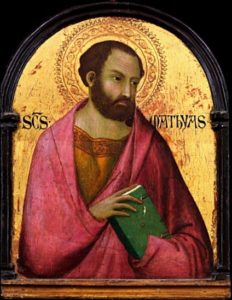 They choose Matthias. Except for Peter and John, none of the Twelve, including the newly chosen, Matthias are mentioned after Acts 1:13.
They choose Matthias. Except for Peter and John, none of the Twelve, including the newly chosen, Matthias are mentioned after Acts 1:13.
It was necessary that 12 men witness the coming of the Spirit at Pentecost as it was necessary for the 12 tribes to witness the giving of the law at Sinai.
We also know that in the future, the twelve apostles and the twelve tribes are mentioned in the Book of Revelation and in the words of Jesus:
Luke 22:28-30 28 “You are those who have stood by Me in My trials; 29 and just as My Father has granted Me a kingdom, I grant you 30 that you may eat and drink at My table in My kingdom, and you will sit on thrones judging the twelve tribes of Israel.
We learn more about Judas in this passage:
In verse 24, we are reminded that Judas turned aside from the Lord and his apostleship. God foretold it in the Book of Psalms (Acts 1:16-20), yet Judas was responsible for his wickedness.
We learn more about how he died. Matthew speaks of his hanging himself, and here we have the aftermath. The weight of the body may have broken a limb, and the body may have decayed, causing him to fall headlong and burst open in the middle causing his intestines to gush out.
The Pharisees hired Judas to betray the Lord, and then when they received the money back from Judas, they did not want the blood money on their hands and bought a field.
The believers prayed for God’s guidance before they “voted” because they wanted to select the man that God had already chosen
Proverbs 16:33 33 The lot is cast into the lap, but its every decision is from the LORD.
This is the last instance of casting lots in the Bible. We are told that in the New Testament era, “If we are willing to obey Him, He will reveal His will to us (John 7:17; Romans 12:1-2).
TODAY’S READING FROM THE BOOK OF PSALMS- PSALM 121:1-8
This Psalm reminds us to recognize our Creator’s majesty, wonder, and strength when we behold the beauty of creation. And then we remember that we have been invited into a relationship with our Creator, who is also our Helper and our Redeemer. We can call upon Him.
Psalm 121:1 1 I will lift up my eyes to the mountains; From where shall my help come?
Psalm 121:2 2 My help comes from the LORD, Who made heaven and earth.
TODAY’S READING FROM THE BOOK OF PROVERBS- PROVERBS 16:18
Proverbs 16:18 18 Pride goes before destruction, And a haughty spirit before stumbling.
This is a well known warning against pride. Pride comes before a fall. Beware of self-boasting. The two phrases are synonymous linking the dangers of pride and arrogance or a haughty spirit. It is best for us to deny self and let Christ, who is our life, be the source of our confidence and the reason for any boasting.
PRAY FOR THE NATIONS-
As the first black African country to gain independence from European rule, the Republic of Ghana today is a country relatively free of internal conflicts with a population that includes many diverse ethnic and religious groups. The former British colony known as Gold Coast has achieved this in part due to a reasonable constitution and a strong educational system that has bridged ethnic and religious divides. Bordered by Cote d’Ivoire and Togo in West Africa and with a coastline along the Gulf of Guinea, Ghana has substantial natural resources. Lake Volta in eastern Ghana is the largest artificial lake in the world and provides electrical power from the Akosombo Dam on the Volta River.
Ghana’s independence in 1957 was followed by a time of corruption and a series of military coups. A new constitution in 1992, however, established a democratic government and Ghana has transitioned successfully to a democratic system. Gold, prominent in Ghana’s political and economic past, continues its economic influence today. Ghanaian cocoa production, second only to Cote d’Ivoire, timber products, and recently discovered oil reserves are also generating income. This well-run country is often used as an economic and political model for reform in Africa.
Christian missionary work began in Ghana in 1828. Today about 63% of Ghanaians call themselves Christians, yet many are nominal in their faith. A dual spirituality influenced by traditional African religions challenges much of the church. The strong Muslim presence in the north of Ghana has launched an aggressive outreach to the rest of the country and is making serious inroads. Current economic struggles have put people in need, and many are open to receiving the gospel of Jesus Christ. Ghanaians under the age of 15, representing over 40% of the nation’s population, are spiritually open and when reached could have a profound impact on the Ghanaian church.
PRAYER: Gracious Father, giver of every perfect gift, we thank You for the gift of the Holy Spirit given at Pentecost. All that the Lord Jesus is at Your right hand is now mediated to us by the Spirit. We are identified, hid, complete, perfected, and accepted in His belovedness. Lord, thank You for reminding us of our responsibility to walk in the Spirit and not after the flesh. We are grateful that Your wrath has been removed and Your favor restored because of Jesus’ atoning sacrifice. Thank You for putting Your seal on the efficacy of His work by raising Him from the dead, receiving Him as our representative, and shedding upon us the gift of Your Spirit. May we grow in the grace of the knowledge of Who You are today. In Jesus’ Name. Amen.
